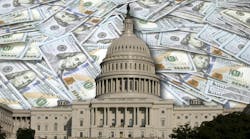The Clean Water and Drinking Water State Revolving Funds are used by municipalities for public drinking water, wastewater and stormwater projects. The U.S. Environmental Protection Agency (EPA) administers the two types of programs with topline funding limits determined by Congress.
How is the funding determined?
Each year, the president submits a budget proposal request to Congress. The U.S. House and Senate Appropriations Committees each hold a series of hearings to outline the topline spending limits for the respective fiscal year. The funding numbers for FY 2026 are currently being determined.
Subcommittees then begin drafting spending bills that are in line with the topline spending limits. The bills are considered at both the subcommittee and full-committee level before advancing for a vote. The House and Senate then enter a negotiation phase where differences are worked out. Both chambers must pass an agreed-upon spending bill before they are sent to the president for signature.
What is the status of the SRFs?
President Trump’s initial budget proposal suggested that the SRFs would see a $2.4 billion reduction compared to FY 2025. The House Interior Subcommittee initially proposed a 19% cut to the Drinking Water State Revolving Fund and a 25% cut to the Clean Water State Revolving Fund.
August 7, 2025
The Senate Subcommittee is currently proposing funding that is in line with the FY 2025 numbers.
The House bill made it through subcommittee on July 15 with a vote of 8 to 5, and through committee on July 22 with a vote of 33 to 28, but the bill still needs initial passage before differences can be resolved with the Senate.
The Senate bill made it through subcommittee on July 24 with a vote of 26 to 2, but still needs initial passage before differences can be resolved with the House.
The deadline for federal appropriations is September 30 each year. The two subcommittees will have to agree upon a spending bill before the president signs it.
About the Author
Alex Cossin
Associate Editor
Alex Cossin is the associate editor for Waterworld Magazine, Wastewater Digest and Stormwater Solutions, which compose the Endeavor Business Media Water Group. Cossin graduated from Kent State University in 2018 with a Bachelor of Science in Journalism. Cossin can be reached at [email protected].


